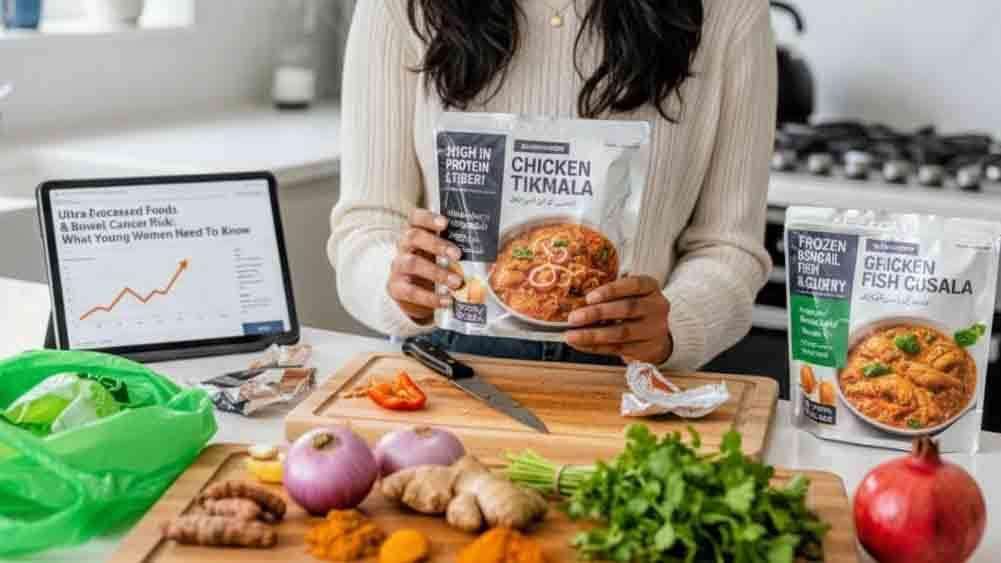The modern, fast-paced life in Britain is driving a concerning dietary transformation within the South Asian community, particularly among the younger generations. While traditional diets are celebrated for their natural ingredients and high fibre content, there is a distinct and worrying shift towards ultra-processed foods (UPFs)—a trend now extending even to staple ethnic dishes, with products like packaged fish curry becoming a marker of modern convenience. This change in eating habits is colliding with alarming new research, putting the focus on the potential health consequences, specifically the rising risk of early-onset bowel polyps which are precursors to colorectal cancer.
The Alarming Link Between UPFs and Pre-Cancerous Growths
Recent studies, prompted by the unexplained increase in bowel cancer rates among younger adults globally, have drawn a significant association between a high intake of UPFs and an increased risk of developing conventional adenomas (a common type of pre-cancerous bowel polyp) before the age of 50.
The Nurses’ Health Study II, a large-scale analysis in the US, found that women under 50 who consumed the highest amount of UPFs—an average of 9.9 servings a day—faced a 45% greater risk of having these early-onset adenomas compared to those who consumed the least (around 3.3 servings a day). This finding remained statistically significant even after accounting for other risk factors like BMI, smoking, and physical activity, indicating a strong independent association. Though the study focused on US women, the results are highly relevant to the British South Asian community, where UPF consumption is also prevalent, often driven by busy lifestyles and food accessibility.
The UK Context: UPFs in British South Asian Diets
The concern is particularly acute for communities like the British Bangladeshi, who have historically maintained strong links to traditional cooking. However, the convenience of industrially produced, ready-to-eat meals, even those marketed as ethnic, is increasingly displacing home-cooked food. This includes the move away from preparing fresh ingredients to relying on packaged, ultra-processed versions of traditional curries and snacks. While data on the specific UPF intake of the British South Asian population is limited, overall UK adolescent consumption of UPFs remains high, with some studies highlighting lower socioeconomic groups as having higher consumption rates. Given that traditional South Asian diets already struggle with low fibre and high saturated fat/sodium intake in a westernised context, the addition of UPFs—which are typically high in salt, sugar, unhealthy fats, and additives but low in fibre and whole foods—compounds the existing vulnerability to metabolic and bowel health issues.
Biological Mechanisms: Beyond Poor Nutrition
The risk associated with UPFs goes beyond their often poor nutritional profile. Researchers suggest several plausible biological mechanisms that could explain the link to bowel polyps and cancer:
- Chronic Inflammation: UPFs are linked to a systemic state of chronic low-grade inflammation (often called "meta-inflammation") in the body. Chronic inflammation is a known driver of colorectal tumourigenesis.
- Gut Microbiome Disruption (Dysbiosis): The high content of additives (like emulsifiers and artificial sweeteners) and low fibre in UPFs can severely alter the gut's bacterial balance, a condition known as dysbiosis. This change can increase intestinal permeability (leaky gut) and promote the production of carcinogenic microbial metabolites.
- Epigenetic Changes: Emerging pilot studies suggest that high UPF consumption may be associated with widespread differences in DNA methylation—a process that affects how genes are expressed—in young women, potentially impacting cancer-related pathways and offering a molecular explanation for the observed health risks.
- Metabolic Disorders: UPFs are strongly linked to the development of obesity and Type 2 diabetes, both of which are established risk factors for colorectal cancer.
A Call for Community-Specific Public Health Action
While the current research points to a strong association rather than definitive causation, the findings offer a crucial piece of the puzzle explaining the rise in early-onset bowel cancer. Health experts, including those from Cancer Research UK, emphasise that overall diet matters most and are advocating for policy-level changes to make healthier, minimally processed ingredients and meals more accessible and affordable for all.
For the British South Asian community, this necessitates a culturally sensitive public health message, one that highlights the danger of replacing traditional, freshly prepared meals with convenient but highly processed packaged alternatives. Education must focus on re-embracing the inherent benefits of fresh, fibre-rich, traditional South Asian cooking and raising awareness of the hidden risks lurking in ultra-processed products, even those that mimic cultural dishes. This vigilance is a vital preventative step to protect the health of the next generation.








.svg)

